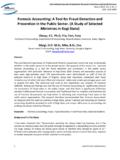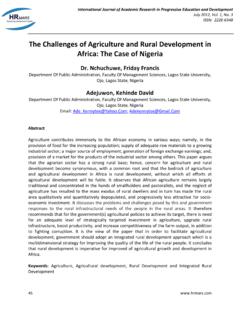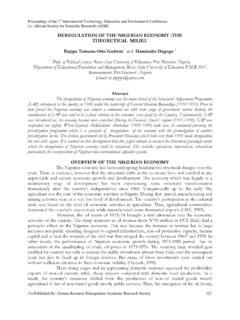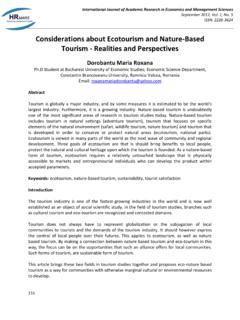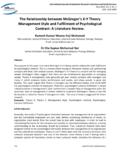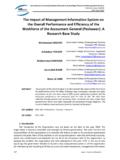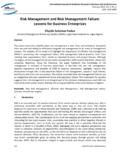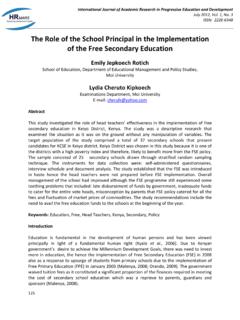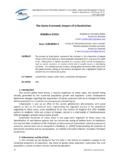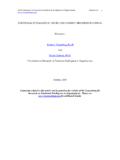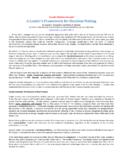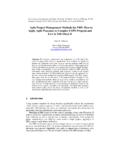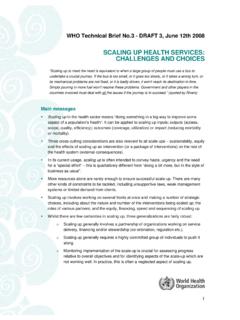Transcription of Factors Influencing Strategic Decision-Making …
1 International Journal of Academic Research in Business and Social Sciences July 2012, Vol. 2, No. 7 ISSN: 2222-6990 405 Factors Influencing Strategic Decision-Making Processes Mahmood Nooraie Ph. D. In Management , Islamic Azad University, Abhar Branch, Iran Email: Abstract Decision-Making is one of the most important functions of managers in any kind of organization. Among different manager's decisions Strategic Decision-Making is a complex process that must be understood completely before it can be practiced effectively. Those responsible for Strategic Decision-Making face a task of extreme complexity and ambiguity. For these reasons, over the past decades, numerous studies have been conducted to the construction of models to aid managers and executives in making better decisions concerning the complex and highly uncertain business environment.
2 In spite of much work that has been conducted in the area of Strategic Decision-Making especially during the 1990's, we still know little about Strategic Decision-Making process and Factors affecting it. This paper builds on previous theoretical and empirical studies to determine the extent to which contextual Factors impact the Strategic Decision-Making processes. Results showed that researches on contextual Factors effecting Strategic Decision-Making process are either limited or have produced contradictory results, especially studies relating decision s familiarity, magnitude of impact, organizational size, firm s performance, dynamism, hostility, heterogeneity, industry, cognitive diversity, cognitive conflict, and manager s need for achievement to Strategic Decision-Making processes.
3 Thus, the study of Strategic Decision-Making process remains very important and much more empirical research is required before any definitive conclusion can be reached. 1. Introduction The recent years have witnessed rapid changes in information technology, the new world economic order, the coming of the new regional power and many others. All these changes have presented on the one hand a very dynamic world of increased population, inflation, social consumption, and on the other hand limited scarce resources. In such a complex and fast changing business environment, managers are faced with a multitude of decisions every day. They have to make decisions even if they are not willing to do so. Pearce II & Robinson (1989) indicated that Decision-Making is inevitable, because to explicitly avoid making a decision is in itself to make a decision .
4 Toffler (1980) in his book entitled The Third Wave indicated that to make too many decisions, too fast, about too many strange unfamiliar problems introduce a new element into management, forcing executives already nervous in unpredictable environment to make more and more decisions and at a faster and faster pace. Among manager's different decisions Strategic decisions are very important and play very vital roles in any organization. International Journal of Academic Research in Business and Social Sciences July 2012, Vol. 2, No. 7 ISSN: 2222-6990 406 This study explores Strategic Decision-Making process and Factors affect the processes. The choice to focus on Strategic decisions is due to its nature and significance.
5 Strategic decisions are long term, highly unstructured, complex, and inherently risky and have great impact on the future of the organization. Strategic decisions are those important decisions that typically require a large amount of organizational resources, and firm s environment consideration. In Strategic decisions, top management usually plays a central role, in making the decisions (Hofer & Schendel, 1978). These decisions influence organizational direction, administration, and structure (Christensen et al., 1982). Since Strategic decision not only affects the organization in which they are taken but also the society (Colignon & Cray, 1980), it is not surprising that Strategic Decision-Making process has been heavily researched (Amason, 1996).
6 In spite of the crucial role of Strategic decisions the strategy process research has not departed significantly from a stage of being based on (Papadakis et al, 1998). Mature paradigms and incomplete assumptions (Eisenhardt & Zbarack, 1992). 2. Literature Review ( Strategic Decision-Making ) The first step in the evolution of Strategic management was taken in the late 1950's, when firms developed a systematic approach to deciding where and how the firm will do its future business (Ansoff, 1984). A strategy is a pattern in the organization's important decisions and actions, and consists of a few key areas or things by which the firm is distinguished from others (Digman, 1986). To Drucker, strategy is a purposeful action while to Mintzberg it is a plan, a ploy, a pattern, a position, and a perspective (five Ps).
7 Strategic management is defined as the set of decisions and actions resulting in the formulation and implementation of strategies designed to achieve the objectives of an organization (Pearce II & Robinson, 1985). According to Schwenk (1988) Strategic decisions are ill structured, non-routine, and important to the firm, in which top management usually plays a central role (Hofer & Schendel, 1978). Strategic Decision-Making is incremental and interdependent, shaped by a variety of contextual influences arising from past events, present circumstances, and perspectives of the future (Quinn, 1980; March, 1981; Das, 1986; Neustadt & May, 1986). One of the central features of Strategic decisions is their lack of structure (Mintzberg et al.)
8 , 1976) mainly due to the complexity of the Strategic problems (Mason & Mitroff, 1981). Gamble and Thompson (2009) found that a company's strategy consists of competitive moves and approaches management has developed to attract and please customers, conduct operations, grow the business, and achieve performance objectives. Strategic Issues Strategic issues can be defined as developments, events and trends having the potential to impact an organizational strategy (Ansoff, 1980; Dutton & Duncan, 1987). These issues can represent problems or opportunities to decision makers. They are important because they affect an organization's ability to achieve its goals or objectives (Dutton & Duncan, 1987). Decision-Making on Strategic issues generally is treated as Strategic decisions and therefore International Journal of Academic Research in Business and Social Sciences July 2012, Vol.
9 2, No. 7 ISSN: 2222-6990 407 deserves Strategic management consideration. According to Pearce II & Robinson (1994) Strategic issues typically have the following characteristics: Require large amount of the firm's resources, Often affect the firm's long term prosperity, They are future-oriented, Usually have multifunctional consequences, They require consideration of the firm's external environment, and Require top-management decisions. Factors Affecting Strategic Decision-Making Process Different theoretical models of Strategic decision processes, which reflect different conceptions of organization, have been suggested by various literatures ( Mintzberg, 1973; Chaffee, 1985; Lyles & Thomas, 1988; Hart, 1992). These models that definitely differ substantially in terms of their underlying assumption(s) about the decision context and the characteristics of decision process are usually influenced by different Factors .
10 The Factors affecting the Strategic Decision-Making in particular the different stages and process can be classified into four major categories. 1. decision -specific characteristics, 2. Internal organizational characteristics, 3. External environmental characteristics, and 4. Management team's characteristics. decision -Specific Characteristics With respect to my literature review, there is limited research dealing with the relationship between Strategic Decision-Making process and decision specific characteristics. Rajagopalan et al. (1993) believed that the relationships between decision specific Factors and decision process characteristics have received very limited attention in past research. According to Papadakis et al. (1998) our understanding, however, of the impact of decision -specific characteristics on organizational Decision-Making process is still quite limited.
